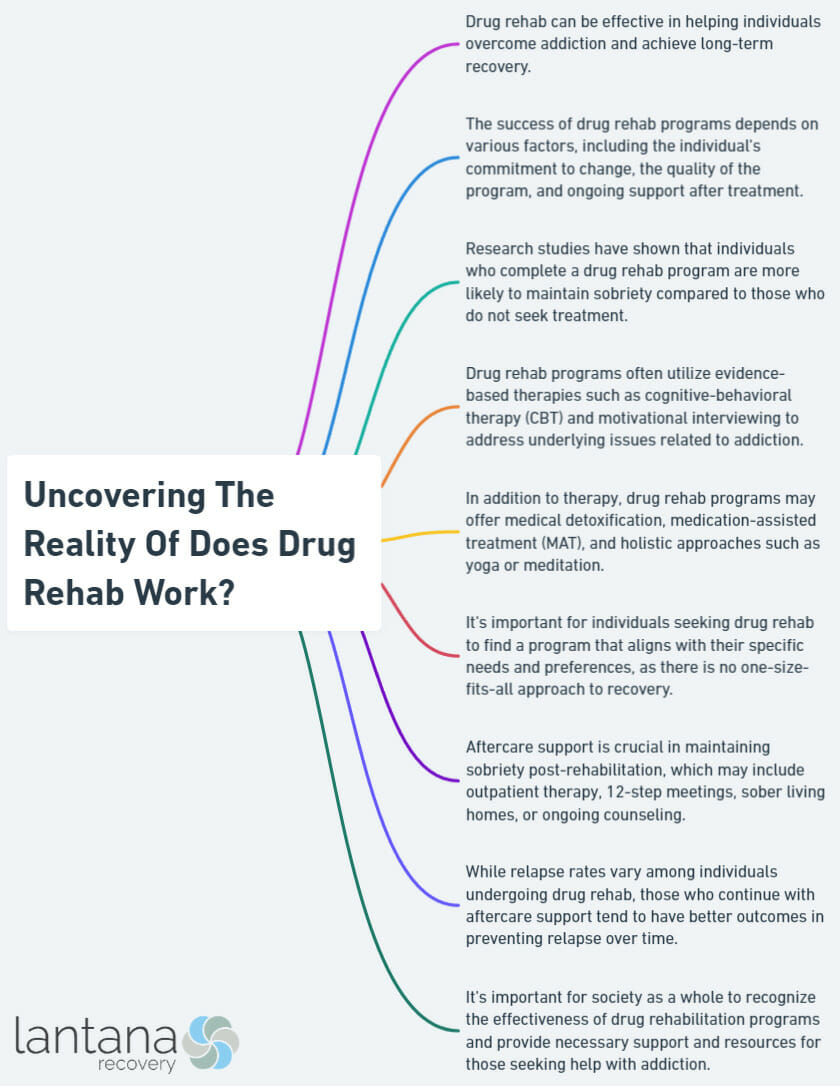Is drug rehab truly effective? This question, “does drug rehab work?”, may linger in the minds of those considering treatment for themselves or their loved ones. When making such a life-changing decision, it’s crucial to understand the factors that contribute to the success of drug rehab and the various options available. In this enlightening blog post, we will delve into the effectiveness of drug rehab, compare success rates for different substances, and explore the role of relapse in the recovery process. So, let’s embark on this journey and uncover the reality of drug rehab and its potential for lasting change.
Short Summary
-
Strong personal commitment and quality of care are key to successful drug rehab outcomes.
-
Evidence-based therapies, full continuum of care and multidisciplinary staff provide the best chance for lasting sobriety.
-
Relapse can be seen as an opportunity to learn & grow in recovery, motivating individuals towards success.
Understanding Drug Rehab Effectiveness

The effectiveness of drug rehab can be measured by improvements in various aspects of life, not just abstinence from drug abuse and alcohol, as suggested by the mental health services administration. However, three key factors contribute to the success of drug addiction treatment: personal commitment, quality of care, and tailored treatment plans.
By investing in these factors and understanding their roles in treatment, individuals can maximize the likelihood of long-lasting recovery.
Personal Commitment
When it comes to drug rehab, personal commitment is an essential factor in achieving success. A strong sense of dedication and motivation helps individuals stay focused on their recovery goals and maintain a new sober lifestyle, which is crucial for effective addiction treatment.
Engaging in beneficial activities, taking care of oneself, and participating in alumni programs offered by addiction treatment centers can actively promote one’s recovery journey. Developing healthy habits like exercising, meditating, and eating healthily can further aid the recovery process, as recommended by the national drug control policy.
Quality of Care
Quality care plays a significant role in successful drug rehab, encompassing evidence-based treatments, staff expertise, and facility accreditation. Cognitive Behavioral Therapy (CBT), for example, serves as the only rehabilitation treatment that helps individuals identify how their emotions influence their thoughts and behaviors, allowing them to take control of their recovery journey.
Group therapy, another essential component of quality care, fosters camaraderie, emotional healing, and a supportive environment for discussing recovery and its many facets. By ensuring that a rehab facility meets high-quality standards, patients can receive the most effective treatment possible.
Tailored Treatment Plans
Every individual struggling with addiction has unique needs, experiences, and circumstances, making tailored treatment plans essential for providing the most effective care. By creating personalized treatment plans that address the specific challenges and underlying issues of each person, rehab centers can give individuals the best chance of successful recovery.
These tailored plans take into account factors such as:
-
the type and severity of addiction
-
co-occurring mental health disorders
-
personal goals
-
individual strengths and weaknesses
This individualized approach allows for targeted interventions, therapies, and support services that are most relevant and beneficial for each person’s recovery journey.
If you are looking for rehabs that offer tailored treatment programs, visit our drug addiction rehab in Charleston.
Comparing Drug Rehab Success Rates

Drug rehab success rates refer to the percentage of individuals who complete a drug rehab program and remain abstinent from drugs and alcohol, enabling them to lead a healthier, more productive life. Success rates may vary depending on the type of substance and treatment, providing valuable insights into their effectiveness.
In this section, we will compare the success rates of various treatment programs for alcohol, opioids, and cocaine and methamphetamine addiction.
Alcohol Treatment Success Rates
Alcohol treatment success rates can be quite promising, with one study How effective is alcoholism treatment in the United States by Journal of Studies on Alcohol showing that within the first year after treatment, one in four clients maintained their sobriety, while others reduced their overall alcohol use by 87%. This highlights the effectiveness of alcohol rehab programs in helping individuals overcome addiction.
Support groups like Alcoholics Anonymous (AA) also show significant positive impact on success rates, with attendees experiencing an incredible rise in sober days and long-term sobriety. This encouraging data demonstrates the potential for successful recovery with the right treatment and support.
Opioid and Heroin Addiction Treatment Outcomes
Opioid addiction treatment success rates can be encouraging, particularly when medication-assisted treatment (MAT) is utilized. Medications such as buprenorphine, methadone, and naltrexone provide essential support in breaking free from opioid addiction, according to David A. Fiellin, MD, a Yale Medicine primary care and addiction medicine specialist studying the benefits of medications for treating opioid addiction.
While success rates can vary depending on individual factors and the specific treatment program, it is important to remember that addiction recovery is a complex process, and research suggests that medication assisted treatment can be highly effective in helping individuals recover from opioid addiction.
Cocaine and Meth Rehab Success Rates
Cocaine and methamphetamine addiction treatment success rates can also be quite promising, depending on the type of treatment provided. Behavioral therapies and long-term residential treatment, for example, have been shown to be highly effective in achieving successful outcomes.
The matrix model, a specific treatment approach for meth addiction, has yielded impressive results. For example, a research published in the International Journal of High Risk Behaviors and Addiction reported, “At the end of follow up relapse, the rate in matrix intervention group was three patient or 25% and in methadone treatment group was eight patients, or 7.66%.” (The Effectiveness of Matrix Interventions in Improving Methadone Treatment, Eghbali et al., 2013)
These success rates highlight the potential for recovery with the right treatment and support.
The Role of Relapse in Drug Rehab

Relapse is a common occurrence during the recovery process and is often misunderstood as a sign of failure. However, relapse can be a valuable experience that helps inform adjustments to the treatment approach and reinforces coping strategies.
In this section, we will explore the role of relapse in drug rehab and how it can be an opportunity for growth and learning.
Relapse Rates for Addiction vs. Other Chronic Diseases
When comparing relapse rates for addiction to those of other chronic diseases, such as diabetes and hypertension, we can see that they are quite similar. This comparison highlights the chronic nature of addiction and helps us understand that relapse is not a unique occurrence in the recovery process.
Just as with other chronic diseases, addiction recovery requires ongoing management and support to maintain long-term success.
Learning from Relapse
Relapse doesn’t have to signify failure in drug rehab; instead, it can be viewed as a valuable learning experience that informs adjustments to the treatment approach and reinforces coping strategies. By understanding the factors that contributed to the relapse and seeking support from healthcare providers, individuals can make necessary changes to their treatment plan and continue on their path to successful recovery.
Embracing the lessons learned from relapse can ultimately strengthen one’s commitment to sobriety and personal growth. It is important to remember that relapse is not a sign of failure, but rather an opportunity to learn.
If you want more information about the success of addiction treatment centers, read our article on does drug rehab work.
Strategies for Enhancing Drug Rehab Success

To maximize the success of drug rehab, several key strategies can be employed, including:
-
A comprehensive and holistic approach to treatment that encompasses prevention, treatment, and recovery services embedded within the larger healthcare system
-
A full continuum of care
-
Evidence-based therapies
-
A multidisciplinary staff
These strategies are important in enhancing drug rehab success.
A full continuum of care is essential for successful drug rehab. This includes prevention services.
Full Continuum of Care
A full continuum of care in drug rehab offers a comprehensive approach to recovery, allowing patients to progress through multiple stages of treatment, including:
-
Detox
-
Inpatient or residential treatment
-
Intensive outpatient treatment
-
Outpatient treatment
-
Aftercare and support for co-occurring disorders
This ensures that all aspects of addiction are addressed, leading to more effective and successful outcomes.
Dual diagnosis treatment, which addresses addiction and co-occurring mental health disorders, is particularly essential for successful recovery.
Evidence-Based Therapies
Evidence-based therapies are treatments that have been scientifically proven to be effective in treating substance use disorders. Cognitive-behavioral therapy, motivational interviewing, and family therapy are just a few examples of evidence-based therapies that can be utilized in drug rehab.
By incorporating these proven treatments, including drug and alcohol treatment, into a comprehensive treatment plan, drug rehab programs can provide the best chances of success for individuals struggling with drug or alcohol addiction. The drug addiction treatment modification approach ensures that each person receives personalized care tailored to their specific needs.
Multidisciplinary Staff and Support
The importance of a multidisciplinary team of professionals in drug rehab cannot be overstated. A comprehensive and holistic approach to treatment at a drug abuse rehab requires collaboration among:
-
Medical staff
-
Therapists
-
Dieticians
-
Recovery mentors
This ensures that all aspects of addiction and recovery are addressed, providing patients with the best possible care and support on their journey to lasting sobriety.
A well-rounded team of professionals is essential to address the physical, mental, and emotional needs of each individual, leading to more effective and successful outcomes.
Navigating Drug Rehab Options

Choosing the right drug rehab facility and program can be a daunting task, but it is essential to ensure success in recovery. By researching and reaching out to treatment providers, individuals can explore available options and make the best choice for their unique needs.
In this section, we will discuss the importance of accreditation and quality standards in selecting a rehab facility and compare the pros and cons of inpatient and outpatient programs.
Accreditation and Quality Standards
Choosing a drug rehab facility that is accredited by the Commission on Accreditation of Rehabilitation Facilities (CARF) ensures that the facility meets the highest standards of quality and safety. Additionally, it is important to select a facility that provides evidence-based treatments and employs a multidisciplinary staff to address all aspects of addiction and recovery.
By prioritizing accreditation and quality standards, patients and their families can have peace of mind knowing that they are receiving the best possible care.
Inpatient vs. Outpatient Programs
When deciding between inpatient and outpatient programs, it is crucial to consider the pros and cons of each type of treatment. Inpatient programs offer comprehensive 24-hour care and support, but can be costly and require time away from work or school. Conversely, outpatient programs provide flexibility, allowing individuals to attend treatment sessions while maintaining their daily lives, but may not offer the same level of care and support as inpatient programs.
Ultimately, the decision should be based on individual needs, circumstances, and preferences, ensuring the best possible chance of success in recovery.

Summary
In conclusion, understanding the factors that contribute to drug rehab effectiveness, such as personal commitment, quality of care, and tailored treatment plans, is essential for maximizing success in recovery. By exploring various treatment options, learning from relapse, and implementing strategies to enhance drug rehab success, individuals can overcome addiction and reclaim their lives. Remember, the journey to recovery is a process, and with the right support and determination, lasting change is possible.
Frequently Asked Questions
What is the success rate of drug treatment?
Overall, drug treatment has a success rate of less than 42%, according to Substance abuse and Mental Health Data Archive by SAMHSA. The chances for success depends on various factors like frequency, duration and type of drugs used, and genetic disposition.
How does addiction affect the brain?
Addiction can drastically affect your brain by taking over the pleasure/reward circuits, leaving you wanting more and making your emotional danger-sensing circuits become overactive with anxiety and stress.
This can lead to a cycle of addiction, where the brain is constantly seeking out the same reward, even when it is no longer beneficial. This can lead to physical and mental health issues, as well as social and financial problems.
It is important to recognize the difference between the two.
What is the importance of treatment and rehabilitation?
Rehabilitation is an essential part of recovery from injury, illness or surgery that focuses on improving physical and cognitive functioning as well as reducing recidivism among adults who have been convicted.
It also helps individuals gain back independence in daily life and enables them to participate in education, work and other meaningful roles.
What are the key factors contributing to drug rehab effectiveness?
Commitment to recovery, quality of care and tailored treatment plans are key factors in successful drug rehab.
These elements are essential for providing individuals with the best chance of achieving long-term sobriety. Treatment plans should be tailored to the individual’s needs and should include evidence-based therapies.
How can relapse be a valuable learning experience in drug rehab?
Relapse can be a valuable learning experience in drug rehab as it can inform adjustments to the treatment approach, reinforce coping strategies and strengthen one’s commitment to sobriety.
It can provide an opportunity to reflect on the causes of the relapse and identify areas for improvement. It can also help to identify triggers and develop strategies to avoid them in the future. Finally, it can help to build resilience and a stronger commitment to sobriety.









